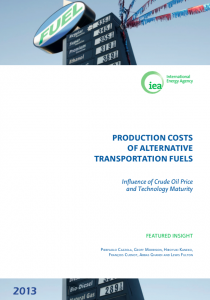Full Title: Production Costs of Alternative Transportation Fuels: Influence of Crude Oil Price and Technology Maturity
Author(s): Pierpaolo Cazzola, Geoff Morrison, Hiroyuki Kaneko, François Cuenot, Abbas Ghandi and Lewis Fulton
Publisher(s): International Energy Agency (IEA)
Publication Date: January 1, 2013
Full Text: Download Resource
Description (excerpt):
This study examines the production costs of a range of transport fuels and energy carriers under varying crude oil price assumptions and technology market maturation levels. It uses an engineering “bottom‐up” approach to estimate the effect of both the input cost of oil and various technological assumptions on the finished price of these fuels. In total, the production costs of 20 fuels were examined for crude oil prices between USD 60 per barrel of oil (USD/bbl) and USD 150/bbl (USD 60/bbl was the reference point as a long‐term series of data were linked to low oil prices, which only increased in the last decade or so).
The paper used data from a range of sources, collected as part of the International Energy Agency (IEA) Mobility Model (MoMo) project (Fulton, Cazzola and Cuenot, 2009). The estimates presented here constitute one of the sources that feed into IEA analyses, such as the IEA Energy Technology Perspectives 2012 (IEA, 2012a), and are part of a wider range of inputs unrepresentative of official IEA estimates. This working paper is intended both to show the results of specific IEA analysis, and solicit comments on the methodology and data used. The fuel cost estimates take into account the costs of feedstock procurement and transportation; feedstock conversion to fuel; and fuel transportation and distribution (including costs of constructing infrastructure and dispensing stations). Specific attention is paid to the transmission and distribution (T&D) costs of hydrogen (H2), bio‐synthetic natural gas (bio‐SNG), and electricity for electric vehicles (EVs), as these fuels’ infrastructures are the least developed of the pathways currently considered.
